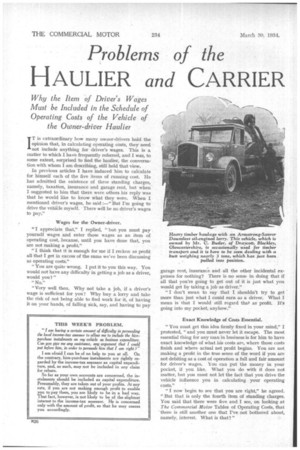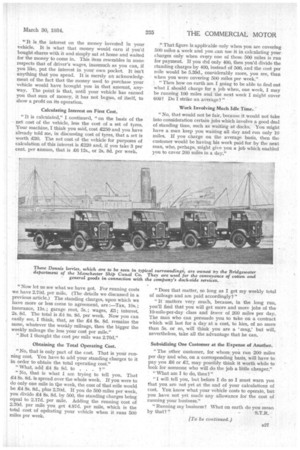Problems of the
Page 32

Page 33

If you've noticed an error in this article please click here to report it so we can fix it.
HAULIER and CARRIER
Why the Item of Driver's Wages Must be Included in the Schedule of Operating Costs of the Vehicle of the Owner-driver Haulier
IT is extraordinary how many owner-drivers hold the opinion that, in calculating operating costs, they need not include anything for driver's wages. This is a matter to which I have frequently referred, and I was, to some extent, surprised to find the haulier, the conversation with whom I ant describing, still held that view.
In previous articles I have induced him to calculate for himself each of the live items of running cost. He has admitted the existence of three standing charges, namely, taxation, insurance and garage rent, but when I suggested to him that there were others his reply was that he would like to know what they were. When I mentioned driver's wages, he said :—" But I'm going to drive the vehicle myself. There will be no driver's wages to pay."
Wages for the Owner-driver.
"I appreciate that," I replied, "hutyou must pay yourself wages and enter those wages as an item of operating cost, because, until you have done that, you are not making a profit" "I think that it is enough for me if I reckon as profit all that I get in excess of the sums we've been discussing as operating costs."
"You are quite wrong. I put it to you this way. You would not have any difficulty in getting a job as a driver, would you?"
"No."
"Very well then. Why not take a job, if a driver's wage is sufficient for you? Why buy a lorry and take the risk of not being able to find work for it, of having it on your hands, of falling sick, say, and having to pay garage rent, insurance and all the other incidental expenses for nothing? There is no sense in doing that if all that you're going to get out of it is just what you would get by taking a job as driver."
"I don't mean to say that I shouldn't try to get more than just what I could earn as a driver. What I mean is that I Would still regard that as profit. It's
going into my pocket, anyhow."
Exact Knowledge of Costs Essential.
"You must get this idea firmly fixed in your mind," protested, "and you must never let it escape. The most essential thing for any man in business is for him to have exact knowledge of what his costs are, where those costs finish and where actual net profit begins. You are not making a profit in the true sense of the word if you are not debiting as a cost of operation a full and fair amount for driver's wages. Ion can put the money in your pocket, if you like. What you do with it does not matter, but you must not let the fact that you drive the vehicle influence you in calculating your operating costs."
"I now begin to see that you are right," he agreed. "But that is only the fourth item of standing charges. You said that there were five and I see, on looking at The Commercial Motor Tables of Operating Costs, that there is still another one that I've not bothered about, namely, interest. What is that?" "It is the interest on the money invested in your vehicle. It is what that money would earn if you'd bought shares with it and simply sat at home and waited for the money to come in. This item resembles in some respects that of driver's wages, inasmuch as you can, if you like, put the interest in your own pocket. It isn't anything that you spend. It is merely an acknowledgment of the fact that the money used to purchase your vehicle would have brought you in that amount, anyway. The point is that, until your vehicle has earned you that sum of money, it has not begun, of itself, to show a profit on its operation.
Calculating Interest on First Cost.
"It is calculated," I continued, "on the basis of the net cost of the vehicle, less the cost of a set of tyres. Your machine, I think you said, cost 2250 and you have already told me, in discussing cost of tyres, that a set is worth 230. The net cost of the vehicle for purposes of calculation of this interest is £220 and, if you take 3 per cent, per annum, that is £.6 12s., or 2s. 8d. per week.
"Now let us see what we have got. For running costs we have 2.70d. per mile. (The details we discussed in a previous article.) The standing charges, upon which we have more or less come to agreement, are ;—Tax, 10s. ; insurance, us.; garage rent, 5s. ; wages, £3; interest, 2s. 8d. The total is 24 8s. 8d. per week. Now you can easily see, I think, that, as the 24 8s. 8c1. remains the same, whatever the weekly mileage, then the bigger the weekly mileage the Jess your cost per mile."
"But I thought the cost per mile was 2.70d."
Obtaining the Total Operating Cost.
"No, that is only part of the cost. That is your running cost. You have to add your standing charges to it in order to obtain the total operating cost."
"What, add 24 8s 8c1. to . . . I" "No, that is what I am trying to tell you. That 24 8s. 8d. is spread over the whole week. If you were to do only one mile in ale week, the cost of that mile would be 24 8s. 8d., plus 2.70d. If you do 500 miles per week, you divide 24 8s. 8d. by 500, the standing charges being equal to 2.17d. per mile. Adding the running cost of 2.70d. per mile you get 4.87d. per mile, which is the total cost of operating your vehicle when it runs 500 miles per week. "That figure is applicable only when you are covering 500 miles a week and you can use it in calculating your charges only when every one of those 500 miles is run for payment. If you did only 400, then you'd divide the standing charges by 400, instead of 500, and the cost per mile would be 5.39d., considerably more, you see, than *hen you were covering 500 miles per week."
"Then how on earth am I going to be able to find out what I should charge for a job when, one week, I may be running 100 miles and the next week I might cover 600? Do I strike an average?"
Work Involving Much Idle Time.
"No, that would not be fair, because it would not take into consideration certain jobs which involve a good deal of standing time, such as waiting at docks. You might have a man keep you waiting all day and run only 10 miles. If you charge on the average basis, then the customer would be having his work paid for by the next man, who, perhaps, might give you a job which enabled you to cover 200 miles in a day."
"Does that matter, so long as I get my weekly total of mileage and am paid accordingly?"
"It matters very much, because, in the long run, you'll find that you will get more and more jobs of the 10-mile-per-day class and fewer of 200 miles per day. The man who can persuade you to take on a contract which will last for a day at a cost, to him, of no more than 5s. or so, will think you are a 'mug,' but will, nevertheless, take all the advantage that he can.
Subsidizing One Customer at the Expense of Another.
"The other customer, for whom you run 200 miles per day and who, on a corresponding basis, will have to pay you £6 or 27, may possibly think it worth while to look for someone who will do the job a little cheaper."
"What am I to do, then?"
"I will tell you, but before I do so I must warn you that you are not yet at the end of your calculations of cost You know what your vehicle costs to operate, but you have not yet made any allowance for the cost of running your business."
"Running my business? What on earth do you mean by that?" S.T.R.












































































